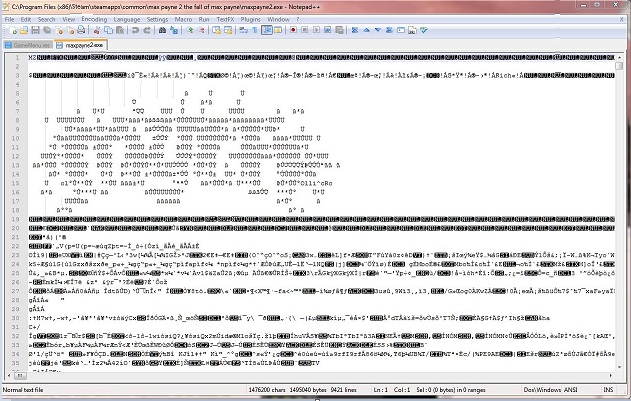Rockstar Used Myth DRM Crack For Max Payne 2?
Looks like Rockstar saved time by applying a no-CD crack to its popular PC game.
A Steam member who recently purchased a digital copy of Max Payne 2 discovered that Rockstar uploaded a version modified by the pirating outfit Myth. The discovery was made after loading up the game's executable with a HEX editor and finding Myth's ASCII logo inserted into the code. The group was once notorious for supplying no-CD cracks for PC games before it was dismantled by the FBI's "Operation site Shutdown" back in 2005.
"Seems Rockstar got a little lazy and used this crack instead of recompilling their executable without DRM," reads this forum post. The observation is quite possible, alleviating some of the work in getting the game to fit within Valve's online closed environment. Then again, where does the law come into play? Are consumers purchasing an illegal copy even though it's supplied by Rockstar?
Two years ago games publisher Ubisoft pulled the same stunt. Consumers who purchased a digital copy of Rainbow Six: Vegas 2 on IGN's Direct2Drive couldn't install the latest patch (v1.03) outside the service. The patch offered considerable changes to the game, even adding new play modes, thus fans really wanted it installed quick--and before D2D could get around to converting the patch to its format. One Ubisoft employee offered a quick and simple solution: to install a patch that got around the patch's original DRM. Eventually it was discovered that the Ubisoft "fix" was actually a no-CD crack supplied by Scene group RELOADED.
Now it appears that Rockstar has used a similar method. Does it matter that the company implemented a no-CD crack into one of its digital titles? It begs to question, especially when developers and publishers are standing on their soap boxes, shouting that piracy is bad, bad, bad.
Get Tom's Hardware's best news and in-depth reviews, straight to your inbox.

Kevin Parrish has over a decade of experience as a writer, editor, and product tester. His work focused on computer hardware, networking equipment, smartphones, tablets, gaming consoles, and other internet-connected devices. His work has appeared in Tom's Hardware, Tom's Guide, Maximum PC, Digital Trends, Android Authority, How-To Geek, Lifewire, and others.
-
Supertrek32 The creators of the crack should sue them for pirating their code. Now *that* would be funny.Reply -
werfu Dead simple. The games has been realized long ago and Rock Star didn't wanted to take much time to release this game to Steam. Recompiling the program would have needed to setup a compiling environment, and check the executable for defects. Instead, they already had the fix right under hand and they new it was working as there was no known issue for this no-cd. Why not use it then?Reply -
Strider-Hiryu_79 supertrek32The creators of the crack should sue them for pirating their code. Now *that* would be funny.Reply
Agreed. -
curnel_D In their shoes, I'd do the same thing. But I think I'd take the care to take out the comment lines and ascii logos.Reply
Lets face it, pirating is great for the developers. And can sometimes lead to sales that would have never happened in the first place. -
bogcotton I don't see anything wrong with it, as long as they made sure it was virus free.Reply
I think there shouldn't be drm in the first place though, it just satisfies a part of the corporate guys feelings. -
pozaks The DRM-less version of Arcanum on GOG uses Fairlight's crack (publ: Activision).Reply
It's likely that a lot of the games on GOG use cracks. I doubt that GOG are putting them in there, it's just that the publishers find this easier than removing the DRM themselves. In many cases they probably don't have the source for many older games, most of which require DRM removal to work as downloadable titles.
Now if you'll excuse me, I'm choking to death on the irony and need medical assistance. -
invlem The hacking groups should go after these companies with bills for "services rendered" to remove the protection.Reply -
RustyXshackleford Laziness. When devs do that, they`re legitimizing the work of the crackers, who shouldn`t have to do all that work anyway. Kill the DRM. Cooperation always beats competition.Reply -
Blessedman This is hilarious and shows how much code stealing goes on in this industry! They just didn't even take the time though to rip out the ASCII logo which is just sad. I wonder if this was the advice of their lawyers to leave their code alone to avoid being dealt a lawsuit from MYTH programmers. Having said all this, I wonder now if these development studio's don't appreciate the hard work the (ok I am old school) crackers do for them. Especially the No-CD cracks which were a favorite of mine even when I had bought the game.Reply
